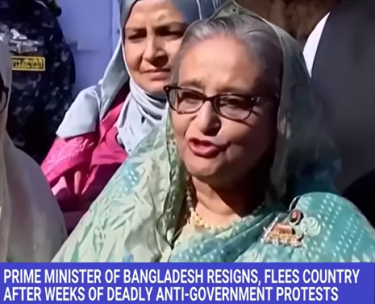
Former Bangladesh Prime Minister Sheikh Hasina is facing serious criminal charges for allegedly causing 848 deaths during last year's widespread public protests. Hasina, who fled to India on 5 August 2024, is now the primary target of a major criminal investigation, even as she continues to stir controversy from abroad.
The Bangladesh Nationalist Party (BNP) filed a formal complaint on 13 February 2025, with the International Crimes Tribunal, which Hasina's own government had originally set up to handle crimes against humanity. The tribunal has issued two arrest warrants against her - one for mass killings and another for making political opponents disappear. Since Hasina is in India, the tribunal has asked authorities to work with Interpol to arrest her.
In addition to it, tensions flared up in Bangladesh, when Hasina made a virtual speech from India on 5 February 2025. The speech triggered violent protests in Dhaka, where demonstrators attacked and set fire to the house-turned-museum of Sheikh Mujibur Rahman, Hasina's father and Bangladesh's founding leader. The museum, located in Dhaka's Dhanmondi-32 area, had been an important political center for Hasina's Awami League party during her 15-year rule.
Md Salauddin Khan, the BNP's case data and coordination chief has detailed the scale and severity of the accusations in a comprehensive statement. The complaint identifies Hasina as the principal accused in the systematic killing of 848 leaders and activists affiliated with the BNP and its associated organizations during the intense period of civil unrest in July and August last year. The charges are not just against Hasina - they also include several important members of her government. These include ministers who oversaw home affairs, law, and information, along with top police officers who are accused of helping stop the protests with violence.
To support their case, the BNP has provided extensive evidence, including lists of names, audio and video recordings, and documents from 84 different cases. Khan emphasized their goal is justice, not revenge, for the systematic killing of their supporters.
A recent United Nations human rights report released on 13 February 2025 paints an even darker picture, estimating that about 1,400 people died during July and August last year, with 12% being children. Over 22,000 people were injured during the protests against Hasina's government.
Hasina’s speech clashes between student protesters and Awami League supporters. The violence lasted three days before the interim government, led by Nobel Peace Prize winner Muhammad Yunus, launched "Operation Devil Hunt." This operation brought in police and paramilitary forces to restore order, leading to the arrest of more than 1,300 people, mostly Awami League members.
Nahid Islam, the Information and Broadcasting adviser, has criticized India for sheltering Hasina, saying, "India must take responsibility for allowing Hasina to give political directions from their shelter." The Bangladesh government has formally requested India to return Hasina, but with no response from New Delhi yet.
Hasina in her virtual address defended her legacy, saying, "Demolishing a building can only destroy a structure but couldn't erase the history." She called her opponents "anti-liberation forces" and warned that "history can retaliate." However, the Yunus government responded that she had "insulted and disrespected" those who died in last summer's uprising.
The current unrest threatens to derail the student movement's efforts to build a new democracy with fair elections and a constitution that can't be manipulated. What began as a protest against job reservations for freedom fighters' descendants in July turned into widespread anger against Hasina's increasingly authoritarian 15-year rule.
Looking ahead, the Anti-Discrimination Student Movement and Jatiya Nagorik Committee have announced plans to form a new political party. Hasnat Abdullah, a key student movement leader, explained that existing political parties have failed to understand the aspirations of the people, especially the youth.
To address these challenges, the transitional government under Yunus has created a "national consensus commission" that will work for six months, starting February 15, to help implement reforms and build a more stable future for Bangladesh. Yunus emphasized that the "new Bangladesh" they're building will be distinguished by following the rule of law, moving away from what he called "the old Bangladesh under fascist rule."




